|
“Serve the Lord with laughter.” It’s a quote from a favorite and incredibly popular saint that might surprise us, for the man who spoke these words was so deep, profound, and intentional that we might overlook the fact that he laughed. When we think of St. Padre Pio, we often instead focus on the deep wounds in his hands—the stigmata which he bore for 50 years—or his ability to levitate, speak with his guardian angel, read souls, or bilocate. Laughter seems too ordinary, perhaps, for sanctity. And yet, as a practical jokester and manager of mischief, I am drawn to this quote deeply—for I feel a personal apostolate of joy and am experiencing that call more starkly in a season in my life marked by exhaustion, stress, and transition. Some of my favorite saints and quotes from Scripture focus on the theme of joy. When asked to speak to a group at Theology on Tap several years ago, I chose “The Serious Call to Joy” as my topic. I love Psalm 34, which reads, “Look to him that you may be radiant with joy.” And I often meditate on Christ’s words to his disciples: “I have said these things to you, so that my joy may be in you, and that your joy may be complete” (Jn 15:11). Finally, a patron of our family is St. Philip Neri, who was lovingly nicknamed “Apostle of Joy.” My son John Philip was even born on his feast day and shares his name. When I think of what I want to be called after my death, I can’t think of anything better than that title given to St. Philip Neri (apart from, perhaps, being known as the Patron Saint of Bacon). To me, joy just seems like the natural fruit of holiness—a sure sign of a deep and profound relationship with Christ. Pope Francis himself has noted this—dedicating an entire encyclical to the joy of the Gospel. He made waves when publishing the encyclical because he said there was no room in evangelization for “sourpusses”—the first time any such term has appeared in a papal document. He explains, “Proclaiming Christ means showing that to believe in and to follow him is not only something right and true, but also something beautiful, capable of filling life with new splendor and profound joy, even in the midst of difficulties.” I think now of joy perhaps because I’m seeing so little of it in general. The world seems bogged down by burdens greater than we think we can bear. And being 8 months pregnant, I find myself a bit bogged down physically and emotionally, too. But, Pope Francis reminds us that the joy of Christ is possible even in the midst of our suffering and hardship. This does not diminish our suffering, nor does it erase or ignore it, but points out that Christian joy can transcend and transfigure suffering. So, when I came across Padre Pio’s quote on his feast day earlier this month, it was a powerful reminder of my call to laughter—or at least of my commitment to being an apostle of joy. Pope Francis continues, “Joy adapts and changes, but it always endures, even as a flicker of light born of our personal certainty that, when everything is said and done, we are infinitely loved.” (EG, 6) The knowledge that I am infinitely loved despite my frailty and littleness, especially in this season of pregnancy, is what beckons me ever onward. If I think of my life right now, I don’t know how else to keep going other than by laughing. I look down to find crumbs and stains dotting my bulging belly. My goal most days is not to waddle while walking. I find myself stopping mid-sentence because I forgot my train of thought or walking into a room to get something just to leave puzzled, muttering to myself. Turning over in bed practically requires the use of a crane. And I face my staircase each day with the determination of one climbing Mt. Everest. Humor aside, if we turn to Scripture, we find a love story saturated with calls and invitations to joy. From the Old Testament to the New, God speaks to us throughout salvation history because he wants to restore his creation to be “man fully alive.” For me, someone who is “fully alive” is a person of joy that radiates love wherever they go. As our world and society continue to navigate times of hardship, transition, and injustice, and as you personally continue to navigate your own crosses (whether they be staircases or not), I invite you to ask St. Padre Pio and other holy men and women to help teach you the secret of joy that comes from “the certainty that Jesus is with us and with the Father.” May we all become apostles and ambassadors of joy to a world thirsting for Christ’s love and may we find creative and nourishing ways to serve the Lord with laughter. As Pope Francis quotes Paul VI saying, “Let us recover and deepen our enthusiasm, that ‘delightful and comforting joy of evangelizing, even when it is in tears that we must sow… And may the world of our time, which is searching, sometimes with anguish, sometimes with hope, be enabled to receive the good news not from evangelizers who are dejected, discouraged, impatient or anxious, but from ministers of the Gospel whose lives glow with fervor, who have first received the joy of Christ.[6]’”
1 Comment
It’s that time of year where students set off for college, some for the first time and some going far away from home. These students take on the challenge of continuing towards adulthood and the process of making their faith their own. This can be a difficult road filled with numerous temptations, stresses, and other challenges. As someone who attended Catholic school for most of my life, I found the transition to college difficult, especially when it came to my faith. I attended a large public university where few practiced Catholicism, and I felt very isolated. The people who I attended Mass with at the beginning of the year began to slowly drift away – going to other churches or becoming too busy with academic commitments. With my class schedule it was hard to make it to the Catholic Student Union events and join the camaraderie. While I adjusted well to college life, I felt alone in my faith. Everyone has different experiences when it comes to the transition into colleges. Whether you are entering college for the first time, a current student wanting to get more in tune with your faith, or even a parent or relative of a college student(s), I’ve compiled some tips about keeping up with your faith life that can be helpful: 1. Make friends who challenge you to be your best selfMake friends wherever you go on campus, but remain close friends with those who continually challenge you to be your best. Many of my closest friends at college weren’t Catholic, yet they held me to remain true to my faith and myself without peer pressure. Just as a spouse is to help his or her partner grow in faith, so too should your friends. 2. Get InvolvedWhether you join the Catholic Student Union or other groups on campus, make sure you are busy. Becoming involved lessens homesickness and other temptations. Enjoy your college experience! 3. Go to Mass every SundayMark it on your agenda. Make sticky notes. Do whatever you need to do so that you attend Mass each week. Experiencing Christ every week in the Eucharist renews us and gives us strength. Fortunately, as Catholics we usually have a variety of Mass times to attend, so take advantage of that! 4. Challenge yourself and set goalsRegularly make short-term and long-term goals, and then try to stick to them. These can be anything from attending adoration regularly, going to daily Mass, setting aside prayer or Bible-reading time, or even studying abroad, trying new foods, and accomplishing a certain academic achievement. 5. Find time every day to pray and appreciate the beauty around youDoing this helps strengthen your personal relationship with God. Plus, you gain a better appreciation for life and develop practices that will stay with you after college. It’s not easy, but it matters that you try. 6. Call your family and your close friends one or more times a weekThese people are important foundations in your life. Keep them updated on your life in college and be honest with them. Your family and friends are a support system when things aren’t easy. 7. Find a MentorYour mentor(s) can be an academic, club advisor, older student, or religious. These individuals in your life can help you navigate college, your future, and strengthen your faith. (Plus letters of recommendation and internship/job advice are certainly helpful!) 8. Talk to people at your local church and get involved in the Mass Become a part of your new parish community at college. Get to know others around you to have that “home away from home.” This will help you make good life-long friends. Plus, getting involved in the Mass helps you become ingrained in the community while deepening your faith. 9. Search for a church you feel most comfortable going toFeeling at home in your college parish is important. Find a church that makes you want to go to Mass. The nearest church may not be your favorite – so explore! My favorite parish in my college town was about 15 minutes away and felt just like my home parish. 10. Find people to go to church with you Having someone to go to church with incentivizes you to go to Mass. Plus, it’s always fun having a buddy. Keep each other accountable! Make it a group event and have brunch or dinner after Mass, too! *This post was originally published on September 8, 2014. “Stay with me, Lord, for I desire to love You very much, and always be in Your company. Stay with me, Lord, if You wish me to be faithful to You. Stay with me, Lord, for as poor as my soul is, I want it to be a place of consolation for You, a nest of love.” These are words taken from the prayer of St. Padre Pio of Pietrelcina after Holy Communion. Padre Pio is known for many supernatural things, including the ability to fly, the ability to bilocate, and having the stigmata of Christ. Those who have taken the time to look into the holy life of Padre Pio will acknowledge his piety, his love for the Holy Eucharist and the Blessed Mother, his great ability to heal people, and his devotion to the Sacrament of Confession. Born in 1887 in Pietrelcina, Italy, Padre Pio entered the novitiate with the Capuchin Franciscans in 1903. Only five years after his ordination, Padre Pio was called into military service with the Italian Army Medical Corps in 1915. Shortly after, the wounds of Christ, the Stigmata, appeared on Padre Pio’s body. The presence of these wounds drew great intrigue and criticism. In the attempts to discover an answer, “Countless experts and doctors looked at his wounds with no clear explanation.” The stigmata, as well as Padre Pio’s great holiness and renown as a confessor, drew pilgrims from all over to visit with him. It is said that Padre Pio was such a prolific confessor that the waiting time for confession with him could stretch for over a week, and he would spend over fifteen hours in the confessional on any given day. Padre Pio is not a holy man who should inspire our lives of faith because he could levitate, bilocate, or see people’s guardian angels. No, Padre Pio is venerated and beloved because of how much he loved the Lord. The Lord granted his servant these graces and gave him these charisms to witness more fully to Christ. It is easy for us to get discouraged because our lives of faith do not include these grand displays of God’s favor. We worry because the saints have such remarkable stories and attributes that we read about while our own lives are so ordinary. But if Padre Pio were still on this earth with us, it is most likely that he would draw your attention away from those miraculous actions and towards our Blessed Mother, the mercy of God in the confessional, and our Lord Jesus Christ in the Eucharist. When my Dad had a serious accident in December 2018, I immediately prayed for St. Padre Pio’s intercession for a miraculous healing. One of my best friends had told me how great Padre Pio’s healing power was, I’d acquired a relic of his, and my devotion was growing. Almost every day, I would pray Padre Pio’s prayer after receiving Holy Communion in the chapel of the hospital or in my Dad’s room. I was drawn to the beauty of the prayer, how it reads like a great ballad, building in intensity and truth. At the same time, the prayer is so simple at its heart: Stay with me, Jesus. Padre Pio knew of his own weakness, the weakness of the human condition, and simply asked our Lord to remain close to him. May this simple yet beautiful prayer be ours today. May, in every situation we find ourselves in, we turn to Jesus as Padre Pio did and with our whole heart implore him, “Stay with me, Lord.” Click here to learn more about St. Padre Pio.
 As with the Christian concept of love or charity, dialogue in a Christian context is focused on the other rather than oneself. As Pope Francis notes in number 198 of his Encyclical Fratelli Tutti, dialogue is a way of coming to know the other: “If we want to encounter and help one another, we have to dialogue.” To truly “encounter and help one another,” we need to deepen our presence more profoundly to the other through dialogue. Careful, patient, attentive, and compassionate listening to both the other person and to the Holy Spirit are needed. Bishop Séamus Freeman, S.A.C., who did much to further the Pallottine charism, would speak of this type of listening as a “trialogue” of each person involved and God. St. Vincent Pallotti understood this well when he focused great attention on the Upper Room or the Cenacle as the place of this type of listening, encounter, and discernment. It is worth our asking a few questions to review the quality of our trialogue. How am I engaging in trialogue? Am I simply having a dialogue, with no reference to God in the conversation? Is my dialogue focused on convincing the other of my point of view? Am I am offering my true thought and feeling to the other person or telling them what they want to hear? How open am I to deeper conversion of my understanding to one that is more aligned with what God is asking of me and the other person? There are no quick and easy answers to these questions. They require reflection in the context of prayer on experiences of dialogue and trialogue that we have. They also require openness to the Holy Spirit and a willingness to cooperate with the grace given by Christ. As we practice trialogue, we begin to see and experience the other person not as “other” but as another in the communal “journeying together” (Cf., Preparatory Document for the 16th Ordinary General Assembly of the Synod of Bishops, 11). May the Charity of Christ urge us on!
“Peace be with you. As the Father sent me, even so I am sending you. Then He breathed on them and said: ‘Receive the Holy Spirit’.” John 20:21-22. The older I become, the more my eyes are opened to the lack of control I have over things of life, how easily I can become consumed by the priorities of the world, and how duped I can be by the devil. I realize more how important it is for me to be waiting in expectation for Jesus to direct and guard me. Do you remember that the first greeting Jesus gave to those he encountered after His resurrection was “peace be with you”? I hang onto those words because this peace is where I am to live. “Peace I leave with you, my peace I give you. I do not give to you as the world gives. Do not let your hearts be troubled and do not be afraid” (John 14:27). Over the past several weeks, I have been reflecting on the Resurrection during my prayer time. When some of the disciples came and saw the empty tomb, they returned home. Mary Magdalene stayed at the tomb, waiting. If you have a minute, spend some time reading John 20. My reflection over these past weeks has focused on Mary Magdalene. Why did she stay? Understanding more of Mary Magdalene’s story, I recognize how profoundly changed she was by her time spent with Jesus. He had, in a sense, loved her back to life! Her salvation was deeply personal and so life-changing that she was willing to seek Him at the tomb and remain there. She wanted to encounter the Risen Lord. All of this has led me to ponder my own spiritual life. Is my salvation that real, that personal? Am I so completely committed to walking in the will of God that I am always waiting to hear His direction for me? Or am I so distracted by the day-to-day that I have lost that readiness to seek His presence in my life? This introspection awakens my desire to be like Mary – who waited by the empty tomb – wanting to encounter the Lord again whenever He chooses to reveal Himself. I want my relationship with my Lord and Savior to be my paramount priority because my identity, purpose, and vocation are rooted in Him. As a Christian, I proclaim that I want heaven – and that comes with the steadfast choice of the way of the Cross of Jesus Christ. Matthew reminds us, “The road to perdition is wide and many choose it. But the road to eternal life is narrow and few find it” (Matthew 7:13). My ideas, my desires, and my decisions need to be aligned with God’s will. As a wife, mother, daughter, friend, colleague, and neighbor, I must be attuned to His voice, His promptings, His guidance, and His graces. Every thought I have, every little act I do, must be in total unity with my Savior – Who is pure, unconditional love. Yes, I want to be like Mary Magdalene waiting for my next encounter with Jesus so I can go deeper and further into His Sacred Heart and become more loving to the people in my life. The question on a very practical level is: how do I achieve this? How do I stay in this disposition of grace, waiting on the Lord? I am bombarded with uncertainty, chaos, division and fear. Satan is prowling to destroy souls. My mind and spirit are attacked from all directions in this troubling world. But one thing remains the same: God is on the throne of heaven, His love for each of us is never-ending, and His promise to be with us is constant. We are told this over and over throughout the Bible. I believe this and I pray for eyes to see the path to walk through the landmines of the day. I ask Him to renew my desire to live and act in joy each day. I recommit daily to looking for goodness in those around me, to refrain from grumbling or criticizing or holding others in judgment. I drink from the well of the Scriptures, particularly the Psalms and the Acts of the Apostles, to keep my focus on His ways. I receive food to strengthen me from the Eucharistic table, the Rosary, the Divine Mercy chaplet, and singing songs of praise. When God quickens my spirit, I share a compliment, a smile, a hug, an encouraging word, a listening ear, or a prayer. Opportunities present themselves continually and my choices are what keep me in the heart of Jesus! This is what makes my salvation personal and allows me to live in joy and hope when the world screams the opposite. Little acts, one choice at a time, keep me ready for His direction. By myself, I am small and weak. Listening to Christian music, hymns or chants, working through the beads of my Rosary, saying numerous prayers, attending Mass frequently, receiving absolution for my many failings in Reconciliation, and doing an examen before bedtime all help me remain in His presence and live in His will. From these, I can smile more easily, speak encouragingly, think positively and share love unreservedly. My salvation on that Cross in Calvary rejoices in the empty tomb and I stand waiting for my risen Savior to protect me and direct me every step of my journey. Lord help me to be bold, to proclaim your truth and to love always, no matter the circumstances. Give me ears to hear Your direction and feet to follow in Your footsteps so that Your love will flow out of me to everyone I meet. And may all our souls be a wildfire of LOVE that burns into our eternal home You have prepared for us in glory! What does it mean to be a spiritual father? For me, the answer is found in the experience of fathers that I have known or know. Some are biological fathers, others are father-figures, such as older relatives and friends, priests, and religious brothers. Each in his own way showed me how to love in a fatherly way. Spiritual fatherhood is loving universally, not particularly. The love of Christ that urges us on is one that loves all, no matter what. That is not easy to do, and I fail more often at it than I succeed. The only way that spiritual fatherhood is possible is through cooperation with the grace of Christ. A spiritual father is one who is aware of the working of grace in his life and assists others in recognizing the movement of grace in their own. Good spiritual fatherhood does not just happen. Yes, for me, after ordination to the priesthood, people started to call me “Father.” It is true that one is configured to Christ in a unique way through the Sacrament of Holy Orders. Cooperation with the grace of the Sacrament is over a lifetime, though. One grows into spiritual fatherhood, even as a priest. In the first few years of priesthood, I tried to be of service to others by being present to them in their sorrow and their joy. The most profound moments were in listening and accompanying others. I learned not to say much, but simply to be with them, to walk with them as they deepened their life in Christ. Today, my approach to spiritual fatherhood is similar, but with the experience of walking with others sometimes for many years. I have found that they choose to be in such a relationship with me, not simply as a priest, but also as one who is a flawed follower of Christ. A good spiritual father does not claim perfection, but instead is very aware of his faults and failings, as well as the grace of Christ that is working in and through him. Pope Francis offers this consideration in Christus Vivit: “An especially important quality in mentors is the acknowledgement of their own humanity – the fact that they are human beings who make mistakes: not perfect people but forgiven sinners” (246). Good spiritual fathers are keenly aware that they are “forgiven sinners.” When that is forgotten by a spiritual father, then the focus becomes on self, not on Christ. He is the one who forgives sin and gives the grace to love unconditionally and universally for he, and he alone, is God, the Infinite Love. Click here to read more reflections on fatherhood during the Year of St. Joseph.
When you hear the word “vocation” what comes to mind?
In my last year of college, vocation seemed like a puzzle to be solved. I put a lot of pressure on myself to figure out “what should I do with my life.” I met with a spiritual director and weighed several options, agonizing over how I would know which was the right choice. Although my spiritual director and many other people in my life tried to tell me that I didn’t have to figure out the entirety of my life just yet, I wasn’t listening. I had a very narrow view of vocation as something to be discerned once and only once. I thought, if you’ve done it right, you stick with your choice for your whole life. I imagined that God had my life mapped out for me and there was a very definite direction I should take; I just needed to figure out which it was. Now, 11 years later, I realize just how much God’s grace has been at work in me in so many ways—especially in broadening my understanding of vocation. I’ve come to really appreciate that discerning one’s vocation is not like completing a task at which we can excel or fail. It’s not a question with a single right answer. In fact, God’s plan for us is none other than to be holy, and to do so in ways specific to us, “to reflect and embody, at a specific moment in history, a certain aspect of the Gospel” (Gaudete et Exsultate, 19). The Second Vatican Council’s Dogmatic Constitution on the Church speaks of this universal and personal call to holiness by saying that “all the faithful, whatever their condition or state, are called by the Lord – each in his or her own way – to that perfect holiness by which the Father himself is perfect” (Lumen Gentium, 11). Each and every one of us has this fundamental vocation, the one that underlies every other particular way in which God calls us to holiness. Holiness isn’t lived out in a single grand way possible for only a select few; “We are all called to be holy by living our lives with love and by bearing witness in everything we do, wherever we find ourselves” (Gaudete et Exsultate, 14). In Gaudete et Exsultate, Pope Francis issues a powerful summons: “You too need to see the entirety of your life as a mission” (GE, 23). With this broader view of vocation, I can more readily recognize the multitude of ways in which God has drawn me to himself throughout the course of my life. I can discern how I am being called to holiness in this moment and reflect on how my response in the here and now is part of my greater life’s mission. Now I understand vocation as more than a single call. It is, rather, living our lives in a constant awareness of and responsiveness to the promptings of the Lord, who draws us to himself. Vocation is not inward looking; it draws us outward to God and neighbor. This redirected gaze allows us to recognize and receive with gratitude the gifts we are given so that we can more freely and truly make a gift of ourselves. Such self-emptying love is what it means to be Christ-like, to be holy. It forces us to reframe our questions. Instead of asking, “What do I want to be?” or “What do I want to do with my life?” (as I kept asking myself in college), we can prayerfully discern “How is God calling me to make a gift of myself?” This certainly applies to my state in life, whether I am called to give of myself in marriage or religious life. But I also respond to this call to self-gift by carrying out my work with integrity and skill in the service of my brothers and sisters, by patiently teaching my little ones how to follow Jesus, by refusing to gossip, and by saying a kind word to the person I encounter on the street (to list a few examples from Gaudete et Exsultate 14- 16). My life’s journey has taken a lot more turns than I could have anticipated those many years ago. Yet the Lord has made use of each step, big and small, to draw me ever closer to himself. Click here for more resources on Vocational Discernment. The past two months we have gotten to celebrate the feast days of many incredibly saints who can be role models for us throughout all the ups and downs of life. This September is no different. As we transition out of summer and enter into new routines in the midst of the continuing pandemic, we can turn to many of the saints this month who are known for their healing and ability to help others grow in their faith. Saints Known for Physical Healing Earlier this month on September 1st, we celebrated the feast of St. Giles. I had never heard of St. Giles until I read a blog post, from the early days of the coronavirus pandemic, about the 14 Holy Helpers. But the more I got to learn about St. Giles, the more his life inspired my own personal faith journey. Even though an injury crippled one of his legs, St. Giles was known for his miracle-working abilities for those who came to him. His mission as a miracle-worker was always centered on others, not himself. A similar selflessness was seen by two martyrs in the early Church, Sts. Cosmas and Damian, whose feast we will celebrate on September 26th. They both were doctors and did not accept payment for any of their services, recognizing the humanity in each person. They utilized their God-given skills to help anyone in need, which led them to become recognized as the patron saints of physicians. All three of these saints remind me that while this world is not our final destination, taking care of our earthly bodies remains very important. In whatever way we may need physical healing, God is eager to hear us and to help us physically as we continue to live out His mission here on Earth. Saints Known for Spiritual Healing Next week, we will celebrate the feast of Our Lady of Sorrows. The Marian feast of Our Lady of Sorrows is special because it is about the spiritual turmoil Mary experienced during her life. This is why Our Lady of Sorrows is typically represented by seven daggers piercing her heart. For me, Our Lady of Sorrows is not just about praying for the intercession of Mary, but also placing our complete trust in the Lord, just like she did throughout the sorrows in her life. This trust was also central to St. Padre Pio’s ministry. He recognized the need for spiritual healing and committed to hearing Confessions, and he understood the significant act of faith it took to go to Confession. Through the intercession of Our Lady of Sorrows and St. Padre Pio, may we take time this month to trust God with spiritual healing in our lives. Role Model Saints for Spiritual Growth This month is bookended by two saints who are role models for integrating spiritual growth into the activities of their daily life: St. Teresa of Calcutta, whose feast was celebrated on September 5th, and St. Vincent de Paul, whose feast will be celebrated on September 27th. The interesting thing about these saints is that they both could have fallen into the categories of physical healing or spiritual healing. But for me, these well-known saints have been role models for integrating caring for other people with spiritual growth. It seems easy to get so focused on our work that we forget the deeper meaning behind it. Mother Teresa and St. Vincent de Paul worked to help those in need, and they saw Christ in everyone and in every task they did. While we may not be feeding the poor of Calcutta every day, we too can try to grow spiritually by seeing Christ in every aspect of our day. As we continue throughout this month of September, let us ask for the saints’ intercession for healing and learn from their lives in order to grow closer to Christ. To learn more about the saints, visit our Catholic Feast Days Website by clicking here. To view a calendar of the feast days in September, and each month, click here.
9/7/2021 “Whoever loses his life for my sake will find it”: Proclaiming Christ’s Challenging Call to LoveRead Now
“Then Jesus said to his disciples, ‘Whoever wishes to come after me must deny himself, take up his cross, and follow me. For whoever wishes to save his life will lose it, but whoever loses his life for my sake will find it’” (Mt 16:24-25).
This summer, I’ve been blessed with the opportunity to work as an intern for the Catholic Apostolate Center and collaborate on several catechetical projects with other staff members there. One of these projects was the creation of a new version of From Practicing Catholics to Apostles on Mission, a faith formation course for those who want to delve more deeply into their faith and become more actively involved in the Church. Since many of the program’s participants are young adults, drafting lessons for this course allowed me to reflect on the unique opportunities and challenges that come with speaking to young adults about the Faith. This task always involves a special focus on presenting Church teaching in a way that is clear, approachable, and attractive. But with this task comes a special challenge: how can we avoid the temptation to “water down” the faith or to omit or sugarcoat its more difficult truths? How can we imitate the most perfect preacher, who stated plainly: “Take up your cross and follow me” (Mt 16:24)? One of the Apostles on Mission sessions on which I worked focuses on the universal call to holiness. It seems to me that this teaching is one that we must take care to proclaim in its fullness, especially when speaking to young people: “The Lord Jesus, the divine Teacher and Model of all perfection, preached holiness of life to each and every one of His disciples of every condition…Thus it is evident to everyone, that all the faithful of Christ of whatever rank or status, are called to the fullness of the Christian life and to the perfection of charity” (Lumen Gentium 40). This message shatters the common assumption that holiness is attainable by only a few individuals who perform extraordinary works. It reveals that holiness consists instead in the “perfection of charity” and thus is truly possible for everyone, because although we cannot all accomplish great or miraculous deeds, we can all act with great love. Proclaiming this universal call to holiness is particularly important because—while we hear the commandments over and over—"Love the Lord your God with all your heart…Love your neighbor as yourself”—a very subtle but serious temptation can creep in. Namely, we can be tempted to love only when it is easy, when we find the other person agreeable, when we think they deserve it. But in fact, the perfect love that Christ commands is often difficult. It is difficult to love God daily by resisting temptation, practicing self-denial, and committing ourselves to regular prayer. It is difficult to love our neighbor on a daily basis by treating them with patience, forgiving their faults, and making a generous gift of ourselves to them. Pope St. John Paul II summarized it well in his address to the young people of Boston: “Real love is demanding. I would fail in my mission if I did not clearly tell you so. For it was Jesus—our Jesus himself—who said: ‘You are my friends if you do what I command you’ (Jn 15:14). Love demands effort and a personal commitment to the will of God. It means discipline and sacrifice, but it also means joy and human fulfillment” (Holy Mass on Boston Common, 1979). St. John Paul II not only acknowledges the difficulty of Christ-like love, he also emphasizes that he has a duty to proclaim this difficulty to the Church. He recognized that if we are not warned that “real love is demanding,” we will inevitably discover this reality through our own experience. And if we are not prepared for difficulty, one of two tragic results will likely occur. Finding love demanding, we may be tempted to believe that Jesus didn’t really mean “Be perfect, just as your heavenly Father is perfect” (Mt 5:48) and might ease up and only love when it is easy. Alternatively, we might be tempted to give up in despair, like the rich young man of the Gospel who was taken aback by Jesus’ demanding invitation and “went away sad” (Mk 10:22). Although we must proclaim to young people the difficulty of what Jesus commands, we can also provide them with the hope that enables all Christians to rise to the challenge that lies before them. The first hopeful reminder is this: God is the one who sanctifies us, who always gives us the grace we need to fulfill his call. Cooperating with this grace does require that we are willing to say “yes” to the daily opportunities to undertake the difficult work of loving. But the further hopeful news is that God generously provides hundreds of these opportunities every day. As Pope Francis illustrates in his apostolic exhortation, Gaudete et Exsultate: “This holiness to which the Lord calls you will grow through small gestures. Here is an example: a woman goes shopping, she meets a neighbour and they begin to speak, and the gossip starts. But she says in her heart: ‘No, I will not speak badly of anyone.’ This is a step forward in holiness. Later, at home, one of her children wants to talk to her about his hopes and dreams, and even though she is tired, she sits down and listens with patience and love. That is another sacrifice that brings holiness. Later she experiences some anxiety, but recalling the love of the Virgin Mary, she takes her rosary and prays with faith. Yet another path of holiness. Later still, she goes out onto the street, encounters a poor person and stops to say a kind word to him. One more step.” A third word of hope: Every time we take one of these “steps”—loving even when it is hard—we train our heart, like runners training for a marathon. With each step, our heart grows stronger, and it becomes easier to love the next time. One more message of hope can be found at the end of St. John Paul II’s words that I quoted before: “[Love] means discipline and sacrifice, but it also means joy and human fulfillment” (my emphasis). This message was closely echoed by another great saint of modern times: St. Teresa of Calcutta. She wrote: “We should ask ourselves, ‘Have I really experienced the joy of loving?’ True love is love that causes us pain, that hurts, and yet brings us joy. That is why we must pray and ask for the courage to love.” When we consider the words of both saints, there initially seems to be a contradiction—how can love cause both pain and joy? But this is ultimately the same paradox that lies at the heart of the Gospel: Christ promises that only he who “loses his life for my sake will find it” (Mt 16:25)—that is, only if we “lose” our life in self-giving can we find lasting fulfillment in this life and eternal happiness in the next. It takes courage and great faith to believe in this promise of Christ, but there are two places we can find evidence to support it. The first is in the witness of St. John Paul II and St. Teresa of Calcutta themselves, along with the countless other saints whose lives witnessed to the truth of their words. These men and women loved with total generosity even when it was difficult; they faced many additional sufferings, and yet they were filled with joy—a joy so radiant and constant that it could not have been a mere appearance. We can also find evidence in our own experience that proves the opposite side of this truth: when we have tried to fill our hearts and lives with things that aren’t God, we have all experienced how quickly happiness flees and gives way to emptiness and sorrow. By witnessing the joy of the saints and recalling our own sorrow when we deviate from the path they trod, we can trust that over time, as we continue the demanding work of striving to love as Christ loved, He will gradually reshape our hearts and help us experience the joy that sacrificial loving brings. In summary, when we share the Gospel with young people, we must take care to speak the fullness of the truth and tell them of both the joy and suffering that accompanies the lives of those who follow Christ. By doing so, we help them avoid the fate of those who excuse themselves or fall into despair when they feel the weight of the cross. But even more, doing so helps them find the narrow path that leads to the life they most desire, “life in its fullness,” as St. John Paul II describes: “Jesus does not ask us to give up living, but to accept a newness and fullness of life that only He can give. The human being has a deep-rooted tendency to ‘think only of self,’ to regard one’s own person as the center of interest and to see oneself as the standard against which to gauge everything. One who chooses to follow Christ, on the other hand…looks on life in terms of gift and gratuitousness, not in terms of conquest and possession. Life in its fullness is only lived in self-giving, and that is the fruit of the grace of Christ: an existence that is free and in communion with God and neighbor” (Message for World Youth Day XVI, 2001). It has been a great gift to collaborate with the Catholic Apostolate Center in their efforts to help others recognize and respond to God’s call to holiness, to the fullness of life. May all of us—of every age—heed this call. May we have the courage to proclaim the fullness of the truth, the strength to love when it is difficult, and the confident hope that doing these things will bring the profound peace and joy that we seek.
Social media has been gaining momentum in the Catholic world since the mid-2010s; however, since the COVID-19 pandemic began, digital evangelization and virtual faith-sharing have become even more important and prevalent. Because in-person liturgies, retreats, and daily interactions were not possible, Church organizations across the U.S. began to increase their digital footprint. Although the Catholic Apostolate Center has used technology and social media as tools for evangelization since its inception in 2011, the COVID-19 pandemic also led the Center to a greater focus on digital evangelization and online formation tools. As an intern with the Catholic Apostolate Center, my time has been punctuated by helping people encounter the Church and faith formation more positively. Specifically, expanding the Center’s courses on Catholic Faith Technologies’ e-learning platform and building an app for the Immaculate Conception Province of the Pallottine Fathers and Brothers has allowed me to create new ways for people to encounter Jesus Christ and learn more about Him. Pope Francis has followed the footsteps of his predecessors by encouraging the Church to continue evangelization over the internet. Our Holy Father has stressed the importance of using the technological means available to us today in order to proclaim the Gospel “to all the nations.” This evangelization can come in many ways and forms, and the Catholic Apostolate Center has embraced this understanding since its foundation. This summer, I have been working on adapting the Center’s “Apostles on Mission” in-person course to be an asynchronous course online with Catholic Faith Technologies’ e-learning platform. As a secondary education major, I was able to hone my skills as an educator by looking at the lesson outlines and plans and advising a break, an activity, or a different method of conveying the content to increase engagement. This project has also helped me look at what intellectual faith formation means and why it is so pertinent to the spiritual life. Formation in the Church calls us to learn more about Jesus, the Church, our Faith, and our own strengths and weaknesses. However, with the advent of the internet, we must cast the net over the right side of the boat, as Jesus calls us, to reach more people and continue to spread the Gospel message. Expanding digital resources for faith formation allows all the faithful to grow closer to our Lord. Digital evangelization can also allow for a more profound personal encounter with Jesus Christ. As seen throughout the pandemic, prayer resources can help people feel connected to the greater Church community. People want to experience various types of prayer to delve deeper into the spiritual life. The Catholic Apostolate Center has been working tirelessly this summer to create a prayer app for the Immaculate Conception Province of the Pallottine Fathers and Brothers. This app—entitled “Revive & Rekindle”—will assist the Pallottine community and the general faithful in growing closer to Christ through the spirituality of St. Vincent Pallotti. This project has allowed me to make two important observations about the Catholic faith. First, we must promote various forms of prayer and devotion to help the faithful find the styles of prayer that best suit them. Second, prayer and devotion must be disseminated and promoted in different media to spread the Gospel message to as many people as possible. The “Revive & Rekindle” app will allow people to grow closer to Jesus through reflections and prayers inspired by St. Vincent Pallotti, who urges us all to become Apostles for the Lord. As a strong proponent of the New Evangelization, Pope Francis encourages us to enter the digital landscape to encounter people and bring them closer to Christ. The Church can only do this through intentional formation and by promoting an encounter with Christ online. As an intern at the Catholic Apostolate Center, I have grown professionally, personally, and, most importantly, spiritually. Working with the Center, I have concretely realized what Pope Francis means when he urges young people not to “wait until tomorrow to contribute your energy, your audacity and your creativity to changing our world. Your youth is not an “in-between time” (Christus Vivit). A vast majority of people in the United States have social media, and since many Catholics are among this number, we have to preach the Gospel on all channels and encounter others and Jesus Himself through means of digital formation and evangelization. We must reach out to all corners of our world and society to be Apostles on mission for Jesus.
|
Details
Archives
July 2024
Categories
All
|
About |
Media |
© COPYRIGHT 2024 | ALL RIGHTS RESERVED





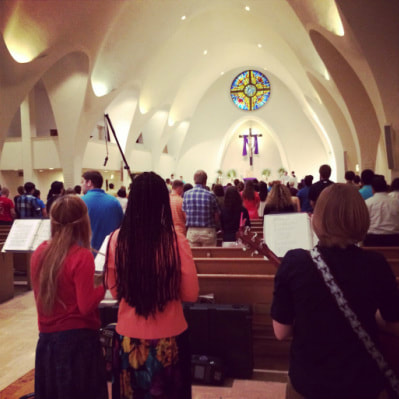



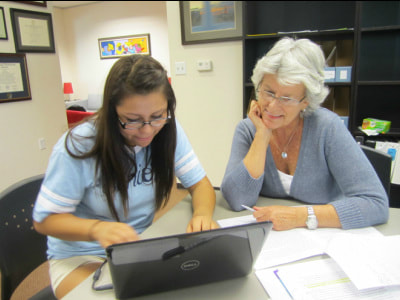
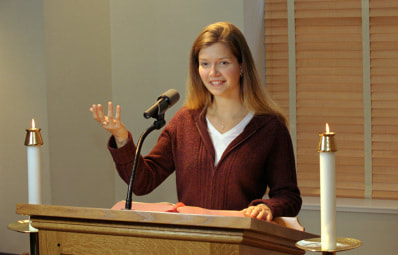
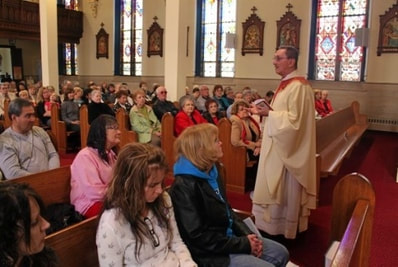
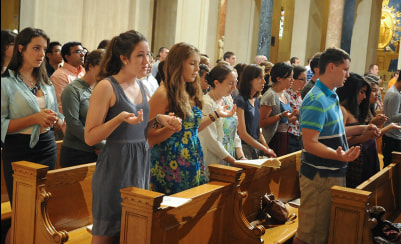

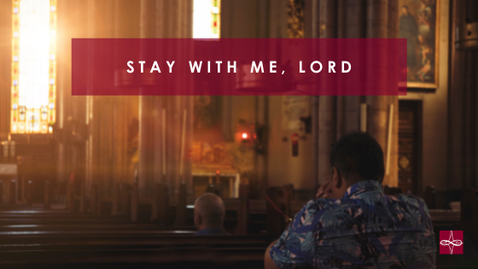
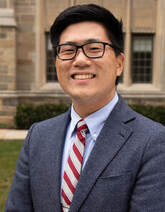
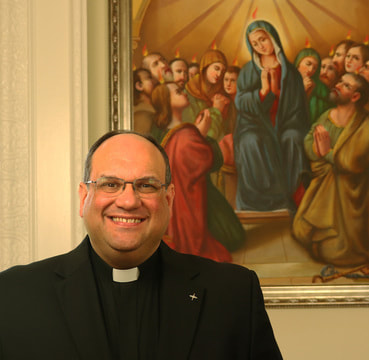


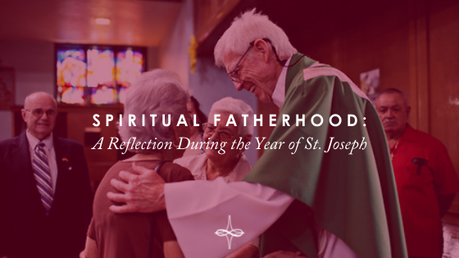


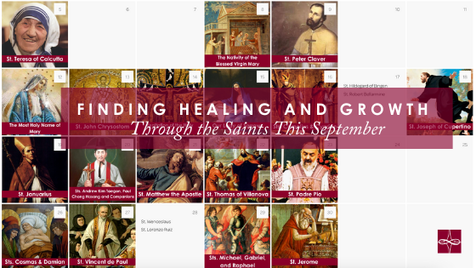

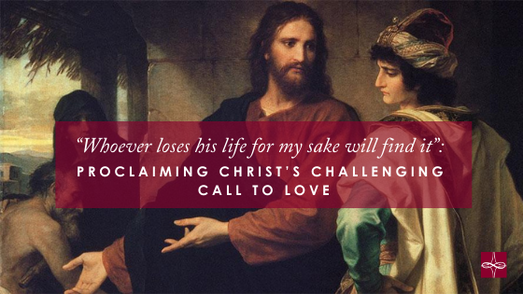



 RSS Feed
RSS Feed